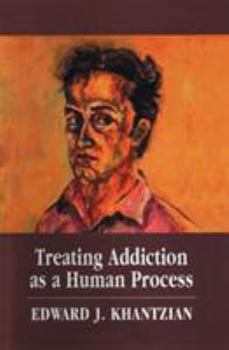Treating Addiction as a Human Process
Select Format
Select Condition 
Book Overview
Innovative and humane treatment of patients with substance use disorders distinguishes this highly esteemed practitioner and major psychodynamic thinker. From his initial contribution of identifying the self-medicating function of abused substances, to the continued elaboration and refinement of his work focusing on the addict's ego deficits of self-regulation and self-care, Edward Khantzian's ideas have become the standard in the field of addictions...
Format:Hardcover
Language:English
ISBN:0765701863
ISBN13:9780765701862
Release Date:June 1999
Publisher:Jason Aronson
Length:712 Pages
Weight:1.25 lbs.
Dimensions:2.1" x 6.1" x 9.3"
Customer Reviews
2 ratings
A New Approach
Published by Thriftbooks.com User , 22 years ago
In contrast to the now popular emphasis on addictive drugs "hijacking" the brain reward centers and producing pleasure, Dr. Khantzian life work has pursued an alternative route in explaining why addictive drugs can become so compelling in an individual's life. His emphasis has mainly and consistently been on the human psychological vulnerabilities involved in addictive suffering. Based on three decades of clinical work with patients, as well as numerous clinical investigative studies, Dr.Khantzian has persuasively instructed us that suffering and problems with selfregulation are at the root of addictive disorders. His work has repeatedly underscored that individuals who become dependent on addictive substances (including alcohol and nicotine) do so not because they seek pleasure or self-destruction (some have considered addictions as "suicide on the installment plan"), but more because they use alcohol and other addictive drugs as an attempt to self-medicate their suffering and to regulate their lives. Although in the long run such attempts cause great disruption in peoples' lives, in the short run individuals have the powerful discovery that each class of drugs have appeal because they relieve a range of painful feelings and help to cope with powerful emotions and behaviors that for them are otherwise overwhelming and unmanageable. Dr.Khantzian has been described as the "father of the self-medication hypothesis of addictive disorders," and has also written extensively on "self-care" deficits associated with the addictions, the importance and utility of modified group techniques and self-help groups in recovery and effective treatments. Dr. Khantzian writes persuasively, evocatively, and compassionately about the human vulnerabilities involved in addictive disorders. Dr. Alan Stone, Professor of Law and Psychiatry at Harvard University, has characterized Dr. Khantzian as a "master ... clinician exploring the internal world of the addicted person ... convincingly demonstrating his self-medication hypothesis," and novelist Dr. Michael Palmer has said that Dr. Khantzian's book, Treating Addiction as a Human Process, is a "highly intelligent volume that can be read with pleasure and awe from beginning to end. It is the cornerstone on which the next generation of knowledge in addiction medicine will be built." Dr. Khantzian has been acknowledged as a pioneering clinician in understanding the psychological and psychiatric pain associated with substance use disorders, and his focus on the self-medicating function of abused substances, and the refinement of his work stressing addict's ego deficits of selfregulation and self-care have become the standard in the field of addiction treatment.Edward J. Khantzian is Clinical Professor of Psychiatry, Harvard Medical School, and a founding member of the Department of Psychiatry at The Cambridge Hospital. He has spent more than 20 years studying psychological factors associated with drug and alcohol abuse. Dr. K
A New Approach
Published by Thriftbooks.com User , 22 years ago
In contrast to the now popular emphasis on addictive drugs "hijacking" the brain reward centers and producing pleasure, Dr. Khantzian life work has pursued an alternative route in explaining why addictive drugs can become so compelling in an individual's life. His emphasis has mainly and consistently been on the human psychological vulnerabilities involved in addictive suffering. Based on three decades of clinical work with patients, as well as numerous clinical investigative studies, Dr.Khantzian has persuasively instructed us that suffering and problems with selfregulation are at the root of addictive disorders. His work has repeatedly underscored that individuals who become dependent on addictive substances (including alcohol and nicotine) do so not because they seek pleasure or self-destruction (some have considered addictions as "suicide on the installment plan"), but more because they use alcohol and other addictive drugs as an attempt to self-medicate their suffering and to regulate their lives. Although in the long run such attempts cause great disruption in peoples' lives, in the short run individuals have the powerful discovery that each class of drugs have appeal because they relieve a range of painful feelings and help to cope with powerful emotions and behaviors that for them are otherwise overwhelming and unmanageable. Dr.Khantzian has been described as the "father of the self-medication hypothesis of addictive disorders," and has also written extensively on "self-care" deficits associated with the addictions, the importance and utility of modified group techniques and self-help groups in recovery and effective treatments. Dr. Khantzian writes persuasively, evocatively, and compassionately about the human vulnerabilities involved in addictive disorders. Dr. Alan Stone, Professor of Law and Psychiatry at Harvard University, has characterized Dr. Khantzian as a "master ? clinician exploring the internal world of the addicted person ? convincingly demonstrating his self-medication hypothesis," and novelist Dr. Michael Palmer has said that Dr. Khantzian's book, Treating Addiction as a Human Process, is a "highly intelligent volume that can be read with pleasure and awe from beginning to end. It is the cornerstone on which the next generation of knowledge in addiction medicine will be built." Dr. Khantzian has been acknowledged as a pioneering clinician in understanding the psychological and psychiatric pain associated with substance use disorders, and his focus on the self-medicating function of abused substances, and the refinement of his work stressing addict's ego deficits of selfregulation and self-care have become the standard in the field of addiction treatment.Edward J. Khantzian is Clinical Professor of Psychiatry, Harvard Medical School, and a founding member of the Department of Psychiatry at The Cambridge Hospital. He has spent more than 20 years studying psychological factors associated with drug and alcohol abuse. Dr. Khant




